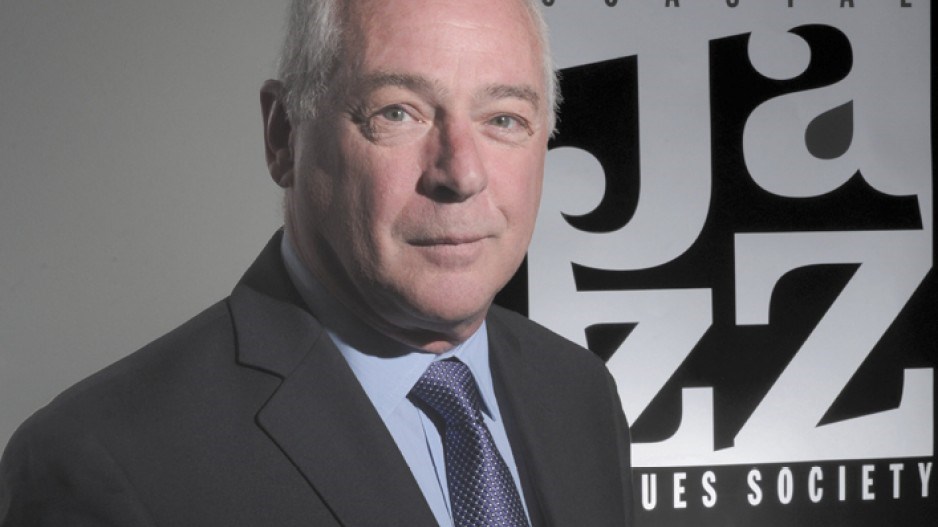Mike Forrester, new executive director of the Coastal Jazz & Blues Society, which puts on the annual TD Vancouver International Jazz Festival, knows the music business from both sides of the spectrum. A former professional musician, he's aware of what artists need to have a rewarding festival experience. On the other hand, his experience in arts management – including a stint at the Toronto Symphony Orchestra (TSO) that helped get that organization off life-support 12 years ago – gives him a clear view of what's required for an arts group to stay relevant and remain solvent.
In a world of shrinking government and sponsorship spending, where consumers have many options for spending their entertainment dollar, Forrester has his work cut out for him.
“Regardless of genre, music has been devalued as a result of the Internet and all kinds of other economic pressures,” said Forrester, 56, in a telephone interview.
“With arts groups, there has always been government funding involved, and governments today are stressed. They have a lot of responsibilities in terms of health care and education and the environment, and culture tends to be last on the list.
“In the area of philanthropy, when you look at people who have [historically been] donors in Canada, they are older, and there is fatigue there.
“Jazz doesn't have a strong history of philanthropy in general, and sponsorship generally has been down across the market in performing arts in Canada. If you look at all those things, it isn't just one challenge, it's a whole bunch of them.”
That being said, Forrester – who succeeds another former Torontonian, Fatima Amarshi, as Coastal's executive director – feels very comfortable in his new role, saying that the Vancouver jazz festival (June 20 to July 1) draws huge crowds and has a demographic that should appeal to sponsors.
He said the challenges will be to increase revenue, diversify sponsorship and convince governments that music is worth supporting.
And while Forrester's background is in classical music, he grew up listening to his parents' jazz records and has always loved the form.
“The opportunity to work in my first love, which is jazz, is quite an extraordinary one,” said Forrester.
Classical roots
Born in Montreal, Forrester moved to Toronto at age 10. A French horn player, he performed professionally for a decade, studying jazz and commercial music in school, playing classical music for a living. An injury sidelined his life as a musician, and he went to work for Ontario broadcaster Classical 96 FM. He worked at the station as promotion director for a decade until, in 1996, a Canadian entertainment mogul came calling.
Garth Drabinsky hired Forrester to work as vice-president of promotions for Livent.
Drabinsky has since been vilified for his illegal activities at Livent, serving a jail term for fraud and forgery after the company folded.
Forrester, however, remembers the good side of the man employees at another of his former empires, Cineplex Odeon, used to call “Garth Vader.”
“He had an extraordinary mind, and he was a creative genius,” maintained Forrester. “When it came to the details of how to produce things at the highest possible level and take them to market, there wasn't anyone better.”
Toronto symphony success
Following the demise of Livent, Forrester spent four years as a consultant, much of that time advising the financially troubled TSO on how it might stay afloat in red ink. Forrester became TSO's vice-president of marketing and development, helping devise strategies to reach younger audiences, and reaching out into the city's Chinese, Korean and Russian populations, a strategy that included advertising in those languages.
“Over a couple of years, the face of the audience really started to change, and we had the right people in place in management and the board to generate some energy in terms of sponsorship and philanthropy.”
Over a seven-year period, revenue doubled and crowds went from 50% capacity to more than 90%.
“Mike Forrester is a wonderful, charismatic personality and a highly creative thinker,” said TSO music director Peter Oundjian, in an email from Scotland. “His love of all music, going back to his university years as a horn player, makes him uniquely poised to be an inspirational leader for the Coastal Jazz & Blues Society.”
Not all of Forrester's ventures have had happy endings. Dancap Productions, a financially troubled theatre group, hired him in 2009 to help turn things around, but the company went under in 2012, two years after Forrester left.
Forrester also worked with the Luminato Festival and with Quebec City's Beaux Arts Museum.
‘Sense of entrepreneurship'
The turnaround at the TSO, and Forrester's talent with corporate and private sponsors and donors, had a lot to do with the Vancouver festival hiring him.
“He brings a sense of entrepreneurship that has been lacking,” said Gary Kushnir, Coastal Jazz & Blues Society secretary and de facto chair of Coastal's hiring committee, which chose Forrester from a field of 43 applicants. Kushnir said that over the years ticket sales have “plummeted” and government funding has fallen off.
“Mike has a key sense of expertise in the development of sponsorship, donors and fundraising,” said Kushnir. “Mike Forrester clearly brings expertise and energy and will help us re-engage with our audience and the community musically, and develop an individual donor program.”
Though the jazz festival has the highest attendance of any arts festival in the province, there's no question it needs to attain larger revenue.
Music festivals have to broaden the palate beyond their specific genre in order to sell more tickets. That can be tricky; you want concerts to attract more listeners, but you don't want to alienate your core audience.
“It's always going to be a balancing act between what you have to do from an artistic and curatorial standpoint,” Forrester said, “and those things that are related to the art that support it but are within the genre.”




